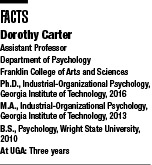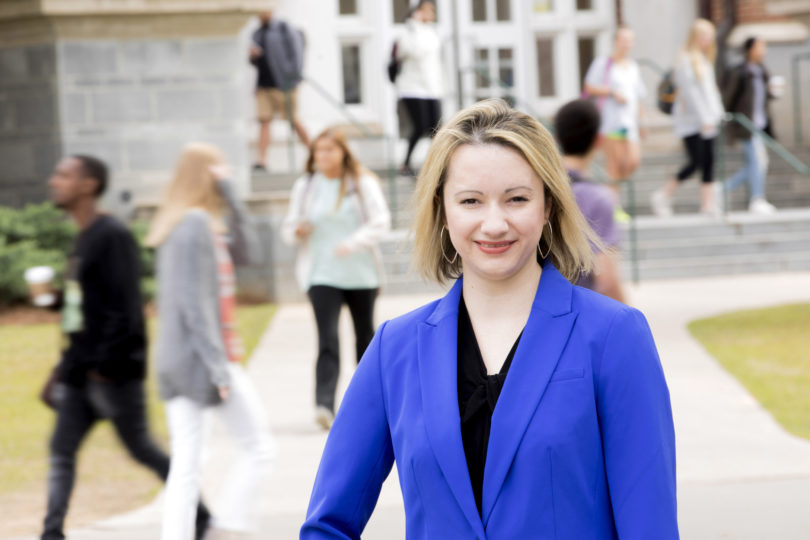For Dorothy Carter, the field of industrial-organizational psychology has the potential to help organizations, researchers and companies solve grand challenges.
As an assistant professor at UGA for the past three years, she has applied I/O psychology principles to do just that. In her Leadership, Innovation, Networks, and Collaboration, or LINC, Laboratory, she and her research team work to help provide solutions for an array of organizations.
 “I/O psychology is the study of people in the workplace,” she said. “There are many topics within that broad heading. My research is focused on teamwork and leadership in organizations.
“I/O psychology is the study of people in the workplace,” she said. “There are many topics within that broad heading. My research is focused on teamwork and leadership in organizations.
“Every organization has certain teamwork issues that need to be addressed,” she added. “For example, how do you get a team of people who are from different backgrounds to work together effectively and solve organizational problems? I/O psychologists try to make the workplace more effective for organizations and employees by applying systematic scientific principles to these types of challenges.”
Most recently, she was awarded a grant to work with NASA and researchers at other institutions around the country to facilitate the teamwork needed to send a team of astronauts on a long-duration spaceflight mission to Mars.
“To send a team of humans to deep space will require effective teamwork processes, like information sharing, backup behavior and coordination. These teamwork processes will need to happen not only among the members of the team that is traveling to deep space, but also on Earth among members of mission control and other teams at different locations around the world,” she said. “In fact, teams are going to need to work together with many other teams from different backgrounds, different areas of expertise and different geographic locations. In order to make that system of teamwork happen effectively, we’ll need to apply best practices from I/O psychology. For example, how should we train people to work in these systems? How should we intervene to make the patterns of communication and collaboration more effective?”
Using an array of methods—interviews with subject matter experts at NASA, analysis of archival documents, agent-based computational modeling and laboratory studies—their goal is to deliver a set of countermeasure interventions to NASA to help facilitate the necessary teamwork across an array of possible situations.
In addition to her research with NASA, Carter investigates teamwork in many other Earth-bound organizations. For instance, she works with a global leadership development company called the Center for Creative Leadership to better understand the teamwork relationships that are needed among members of top management teams in organizations.
She also has been working with the Georgia Clinical & Translational Science Alliance to help with the grand challenge of making sure that basic scientific research related to medicine translates to real world practice in a meaningful way. For the past decade, the Georgia CTSA involved Atlanta-area universities and hospitals such as Emory, Georgia Tech and the Morehouse School of Medicine. The most recent iteration of this grant, however, included the University of Georgia as a means to extend translational research to the entirety of the state.
“A key goal of the Georgia CTSA is to break down barriers to collaboration across participating institutions and disciplines on a variety of levels,” Carter said.








